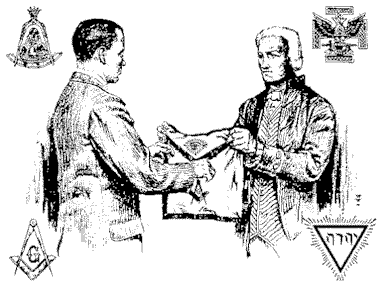
Historical Facts
Masons, also known as Freemasons, comprise the oldest philanthropic, community-oriented fraternal organization in the world. Masonry is not a religion, but its members must express a belief in a Supreme Being, and each Mason is encouraged to practice the religion of his choice.
Freemasonry stresses building of character, knowledge, patriotism, brotherhood, family involvement and community service among its members.
The Masons trace their origins back to the Middle Ages, when operative stonemasons, responsible for the construction of majestic castles and cathedrals, organized themselves into guilds.
The earliest known documented appearance of the Masons was in the Regius Manuscript Cerea, a “poem of moral duties,” written in approximately 1390. Some Lodges in Scotland are reported to have minutes dating back to the 1600s, and the first formal association of Masons was the formation of the Grand Lodge in England in 1717.
During the 1700s the Masons became established in Colonial America. Several Lodges came into existence across the colonies, and in 1731 Benjamin Franklin joined St. John”s Lodge in Philadelphia.
Nine of the fifty-six signers of the Declaration of Independence were Masons; thirteen of forty signers of the Constitution were Masons.
What is Freemasonry?
Freemasonry is the oldest and largest fraternal organization in the world:
- open to all men of good will who believe in a supreme being of their choice;
- in upholding the laws of the land;
- in helping each other;
- in improving their communities;
- and in the brotherhood of mankind.
- support local charities in the western New York area.

When is a man a Mason?
When he can look out over the rivers, the hills, and the far horizon with a profound sense of his own littleness in the vast scheme of things, and yet have faith, hope, and courage—which is the root of every virtue.
When he knows that down in his heart every man is as noble, as vile, as divine, as diabolic, and as lonely as himself, and seeks to know, to forgive, and to love his fellowman.
When he knows how to sympathize with men in their sorrows, yea, even in their sins—knowing that each man fights a heard fight against many odds.
When he has learned how to make friends and to keep them, above all how to keep friends with himself.
When he loves flowers, can hunt birds without a gun, and feels the thrill of an old forgotten joy when he hears the laugh of a little child.
When he can be happy and high minded amid the meaner drudgeries of life.
When star-crowned trees and the glint of sunlight on flowering waters subdue him like the thought of one much loved and long dead.
When no voice of distress reaches his ears in vain, and no hand seeks his aid without response.
When he finds good in every faith that helps any man to lay hold of divine things and sees majestic meanings in life, whatever the name of that faith may be.
When he can look into a wayside puddle and see something beyond mud, and into the face of the most forlorn fellow mortal and see something beyond sin.
When he knows how to pray, how to love, how to hope.
When he has kept faith with himself, with fellowman, and with his God; in his hand a sword for evil, in his heart a bit of a song—glad to live, but not afraid to die!
Such a man has found the only real secret of Masonry, and the one which is trying to give to all the world.